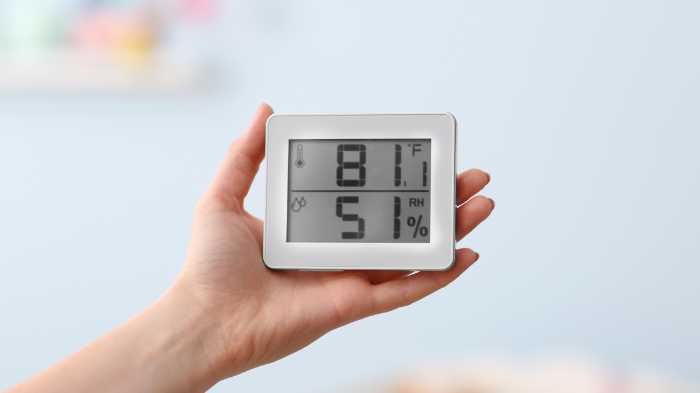Ideal Humidity for Basement
Feb 05, 2024
Ideal Humidity for Basement
Welcome to our blog, where we dive deep into the secrets of maintaining a healthy and comfortable basement environment. One crucial aspect that often gets overlooked is humidity levels. Did you know that excessive humidity can lead to mold growth, musty odors, and even structural damage?
Don’t fret! In this article, we will guide you through understanding basement humidity, factors affecting it, recommended levels for your space, and practical tips on how to achieve the ideal balance. So grab a cup of coffee (or tea) and let’s get started on transforming your damp dungeon into a cozy retreat!
Understanding Basement Humidity
Basement humidity refers to the amount of moisture present in the air within your basement. It’s important to understand that basements are naturally more prone to higher levels of humidity due to their location below ground level. This can be exacerbated by factors such as poor ventilation, water leaks, or high levels of groundwater surrounding your home.
Excessive humidity in your basement can lead to a variety of issues. One common problem is mold growth, which not only looks unsightly but also poses potential health risks for you and your family. Additionally, high humidity can contribute to musty odors permeating throughout your basement, making it an unpleasant space to spend time in.
Monitoring and controlling basement humidity is crucial for maintaining a healthy environment. A hygrometer is a handy device that measures the relative humidity in any given space. Ideally, experts recommend keeping basement humidity levels between 30% and 50%. This range provides optimal conditions where mold growth is inhibited while still ensuring comfortable air quality.
Now that we understand the importance of managing basement humidity let’s delve into the various factors that can affect these moisture levels.
Factors Affecting Basement Humidity
Basements are notorious for being damp and humid, which can lead to a host of problems such as mold growth and musty odors. Understanding the factors that contribute to basement humidity is essential in maintaining a healthy living space.
One significant factor that affects basement humidity is inadequate ventilation. Without proper airflow, moisture becomes trapped in the basement, leading to increased humidity levels. Poor insulation can also contribute to high humidity as it allows moisture from outside to seep into the basement.
Another factor is water intrusion. If your foundation has cracks or leaks, water can easily find its way into your basement, increasing overall moisture levels.
Additionally, activities within the home can impact basement humidity. Everyday tasks such as cooking, bathing, and doing laundry release moisture into the air which can make its way down to the basement if not properly ventilated.
Weather conditions play a role in basement humidity. High outdoor humidity levels coupled with warm temperatures create an ideal environment for excess moisture buildup in basements.
Understanding these factors will help you identify potential sources of excessive humidity in your basement so that you can take appropriate measures to address them effectively. Stay tuned for our next blog post on recommended humidity levels for basements!
Recommended Humidity Levels for Basements
Maintaining the right humidity levels in your basement is crucial to prevent issues like mold growth and musty odors. So, what are the recommended humidity levels for basements? Well, experts suggest keeping the humidity level between 30% and 50%. This range helps inhibit mold growth while still providing a comfortable environment.
Humidity levels below 30% can lead to dry air, which may cause respiratory problems and make the space uncomfortable. On the other hand, exceeding 50% can create a breeding ground for mold spores and encourage their growth.
To monitor humidity levels accurately, use a hygrometer. This device measures moisture in the air and provides real-time readings. If you notice that your basement’s humidity consistently falls outside of the recommended range, it’s time to take action.
There are several ways to control basement humidity effectively. First, ensure proper ventilation by installing exhaust fans or opening windows regularly to allow fresh air circulation. Additionally, using a dehumidifier can help remove excess moisture from the air.
Another helpful tip is insulating your basement walls and floors properly. Proper insulation prevents condensation buildup on surfaces that could contribute to increased humidity levels.
Remember that different seasons may affect basement humidity differently due to changes in temperature and weather conditions. During hot summers when outdoor air is humid, you might need additional dehumidification measures like running an air conditioner or using portable dehumidifiers.
By maintaining ideal humidity levels in your basement year-round, you’ll not only prevent potential issues but also create a healthier living environment for yourself and your family!
Balancing Humidity in Summer and Winter
When it comes to basement humidity, the seasons play a significant role. In the summer, high outdoor humidity levels can seep into your basement, creating a damp and uncomfortable environment. On the other hand, during winter months, heating systems can dry out the air, causing low humidity levels that lead to issues such as cracking furniture or even respiratory problems.
To maintain an ideal humidity level in your basement throughout the year, you need to take some proactive steps. Invest in a dehumidifier that can effectively remove excess moisture during humid summer days. Consider using a humidifier during dry winter months to add moisture back into the air.
Another important aspect is proper ventilation. Open windows and use fans during summers to promote airflow and reduce humidity buildup. During winters though it may seem counterintuitive but keeping windows closed will help retain moisture indoors.
Regularly checking for any leaks or water seepage is crucial as well since these issues can contribute significantly to increased basement humidity levels. Fixing any sources of water infiltration will go a long way in maintaining optimal conditions.
By taking these measures and being mindful of seasonal changes in temperature and humidity levels, you’ll be able to achieve a balanced atmosphere all year round in your basement.
How to Lower Basement Humidity
Basement humidity can be a major issue for many homeowners. Excess moisture in the basement not only causes unpleasant odors and mold growth, but it can also lead to structural damage over time. If you’re dealing with high humidity levels in your basement, don’t worry! There are several effective ways to lower basement humidity and create a healthier living environment.
Ensure proper ventilation in your basement by opening windows or installing exhaust fans. This will allow fresh air to circulate and help remove excess moisture. Consider using a dehumidifier specifically designed for basements, as they are more powerful than regular dehumidifiers and can effectively control humidity levels.
Next, check for any leaks or water seepage in your basement walls or floor. These issues should be addressed promptly to prevent further moisture buildup. Repair any cracks or gaps using waterproof sealants or epoxy injections.
Another effective method is insulating your basement walls and pipes to prevent condensation from forming. Use insulation materials that have vapor barriers to keep moisture out.
Additionally, make sure gutters and downspouts around the perimeter of your house are clean and functioning properly. Redirecting rainwater away from the foundation prevents water from seeping into the basement.
Consider using desiccant bags or containers filled with substances like silica gel or calcium chloride to absorb excess moisture in smaller areas of the basement.
By following these tips, you can successfully lower basement humidity levels and create a more comfortable living space while protecting your home from potential damage caused by excessive moisture infiltration.
Contact Rescon Solutions Today
If you want to stay updated with the latest tips and tricks for maintaining ideal humidity levels in your basement, sign up for our newsletter! Our team of experts is dedicated to providing you with valuable information on basement humidity control, as well as other home improvement topics. By subscribing to our newsletter, you’ll receive regular updates right in your inbox.
Don’t let basement humidity issues ruin the comfort and safety of your home. Take proactive steps to understand and manage the humidity levels in your basement. With the right knowledge and tools, you can create a healthier living environment and protect your property from potential damage.
Remember, maintaining ideal humidity levels is not just about preventing mold growth or musty odors; it’s also about safeguarding your investment and ensuring that your basement remains a functional space within your home. So why wait? Contact us now and start on the path towards a perfectly balanced basement!
Contact us today for more information! Click here.
Thank you for reading our blog post on understanding ideal humidity levels for basements. We hope this information has been helpful in guiding you toward creating a healthier environment within your home. If you have any questions or would like further assistance, feel free to reach out to us. Happy dehumidifying!

